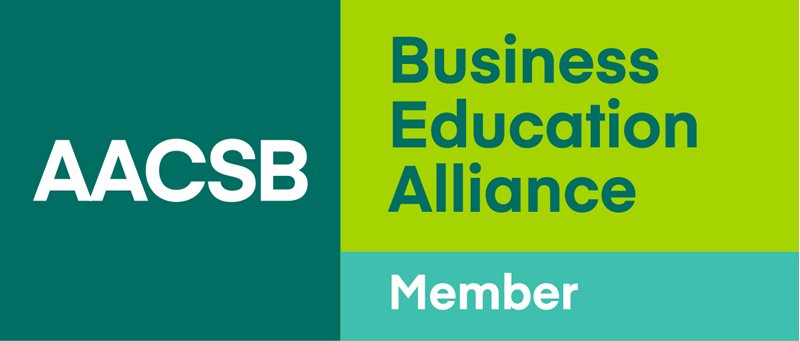Overview
The supply chain is one of the most essential sectors of the Canadian economy, involving about 767,000 workers from a range of occupations and industries. The success of this sector in meeting its human resources and labour-market challenges has the potential to positively influence the future of Canada, and the quality of life that we all enjoy (Canadian Supply Chain Sector Council).
This graduate certificate program builds on the student’s previous education and work experience and introduces all facets of supply chain management and logistics from a theoretical and practical perspective. Program participants are provided with a comprehensive understanding of the principles and techniques considered essential for employment in this sector and benefit from an integrated field placement opportunity upon completion of the course work.
St. Lawrence College is a member of the AACSB Business Education Alliance. Membership in AACSB, and participation in the Business Education Alliance, does not imply Accreditation.
Program Details
Program Highlights
Students from SLC’s Supply Chain Management program have had the opportunity to participate in the SCMA Student Case Competition for several years. Working in a team, students explore a scenario pertaining to a supply chain problem. The teams develop recommendations based on their research, data analysis, and study of financial implications, and present their solution to a panel of industry and academic judges. The case competition allows students to enhance their academic skills by applying concepts, tools and techniques of supply chain and operations to solving a real world business problem.
Professional Designations
Earn the CITT-Certified Logistics Professional® (CCLP®) Designation
St. Lawrence College has a Memorandum of Understanding (MOU) with CITT – Canada's Logistics Association, for students in the Supply Chain Management graduate certificate program. Through this partnership, students who meet academic requirements will be eligible to earn the CITT-Certified Logistics Professional® (CCLP®) designation, a prestigious credential in the supply chain and logistics sector.
This agreement integrates the academic requirements for the CCLP® designation into SLC’s program, so that graduates will not only gain industry-specific knowledge but will also leave with a recognized professional credential, giving graduates a competitive edge in the job market.
Under the terms of the MOU, students in the Supply Chain Management program, who achieve the minimum grades in key courses, will satisfy all the academic requirements necessary to earn the CCLP® designation. This credential provides students with a direct path to employment opportunities in various sectors, including transportation, warehousing, and distribution, while also offering professional recognition and credibility in the supply chain industry.
Gain Advanced Standing Towards The Certified Supply Chain Leader (CSCL) Designation
St. Lawrence College's agreement with the National Institute of Supply Chain Leaders (NISCL) gives Supply Chain Management graduates advanced standing towards obtaining their Certified Supply Chain Leader (CSCL) designation. Students who achieve a mark of 70% (GPA 3.0) or greater will be except from 50% of the required modules (4 of the 8) and 30% of the required workshops (2 of the 6).
Exceptions include:
- Module 2: Procurement Strategy and Supply Management
- Module 3: Inventory, Logistics Management and Transportation
- Module 6: Global Strategic Sourcing
- Module 8: Major Projects, Capital Goods and Services
- Workshop 1: Effective Leadership
- Workshop 5: Risk Management
To complete the designation, graduates must still successfully complete the following program requirements:
- Module 1: Foundations of Supply Chain Management
- Module 4: Operations and Process Design Management
- Module 5: Knowledge Management
- Module 7: Public Sector Supply Chain Management
- Workshop 2: Art of Negotiation
- Workshop 3: Importance of Communication
- Workshop 4: Contract Management and Competitive Bidding
- Workshop 6: Ethics: Social and Environmental Responsibility
- Final Exam Process (Preparatory Workshop and Final Written Exam)
- Three years of practical experience in supply chain management
Related News Articles
City of Cornwall emerges as major distribution hub with over five million square feet of warehouse space. With new centres from Walmart, Michelin, and Loblaw, Cornwall solidifies its role as a key player in Canada’s supply chain. Click here to read the full article from Ottawa Business Journal
St. Lawrence College + Rose Rocket (www.roserocket.com): Working together to build future generations of the trucking industry
Rose Rocket teamed up with St Lawrence College’s Supply Chain Management program to help support an educational program that simulates working at a trucking company and encouraging students to pursue a career in transportation.
Program Outline
2025-2026
This course equips students with the essential skills to succeed in today’s evolving job market and navigate career transitions with confidence. It bridges the gap between education and employment by covering resume writing, interview preparation, and professional communication. Students also examine key employment legislation and workplace rights, preparing them to enter the workforce well-informed. By refining their professional portfolios, learners gain valuable tools and insights for long-term career growth and advancement.
Students are introduced to data analysis techniques used in supply chain management, focusing on data interpretation, manipulation, and visualization through industry-relevant software. Emphasis is placed on how data supports strategic decision-making and improves business performance. Learners develop practical skills to increase operational efficiency and gain insight into solving complex supply chain challenges.
This course provides students with a foundational understanding of international business practices. Topics include globalization, import/export regulations, international market entry strategies, and the role of technology in global trade. Learners examine how cultural differences impact communication, negotiation, and leadership in multinational environments. Risk mitigation strategies in international markets are also explored, preparing students for cross-border operations.
Students gain a comprehensive understanding of the five key modes of transportation—road, rail, air, water, and pipeline—and their strategic roles in supply chains. The course explores operational, financial, and environmental considerations of transportation management. Through case studies and real-world simulations, students develop analytical tools to evaluate transportation options, assess costs, and navigate legal and logistical complexities, including reverse logistics.
With global supply chains increasingly vulnerable to disruption, this course focuses on identifying and mitigating risks in manufacturing, warehousing, and transportation. Students explore risk management tools such as FMEA, PMI, and probabilistic and deterministic models. Emphasis is placed on building business continuity plans and evaluating supplier strategies (single, sole, or multiple sourcing) to ensure quality, reliability, and sustainable financial performance.
Effective leadership is essential in today’s dynamic supply chain environment. This course provides students with a comprehensive understanding of the leadership competencies needed to manage complex logistics operations. Students explore communication, strategic thinking, team development, and change management—key elements required to lead diverse teams and optimize supply chain outcomes.
Students learn to apply Lean and Six Sigma methodologies to streamline processes, reduce waste, and enhance quality in supply chain operations. Key tools such as 5S, DMAIC, value stream mapping, and root cause analysis are introduced. The course emphasizes data-driven decision-making and continuous improvement to boost efficiency, drive performance, and increase customer satisfaction.
Building on the first data analysis course, students dive deeper into advanced analytical tools and techniques. Topics include database integration, data visualization, forecasting, PivotTables, and Solver. Students use these tools to make informed decisions that improve supply chain efficiency, agility, and responsiveness.
This course explores the principles of effective inventory and warehouse operations, emphasizing optimal facility layout, safety, and process efficiency. Students learn to balance capacity and demand, manage inventory risks such as damage or obsolescence, and integrate emerging technologies like robotics to improve visibility and productivity across the supply chain.
Strategic procurement is critical to maintaining smooth supply chain flows and protecting organizational reputation. In this course, students examine ethical sourcing, supplier relationship management, and cost analysis. Emphasis is placed on aligning procurement strategies with business goals to enhance performance and resilience.
This course introduces modern production and operations management techniques, including material selection, quality control, and process optimization. Students explore how automation and innovation can drive sustainable production systems. The course prepares learners to lead manufacturing environments that are efficient, adaptive, and quality-focused.
Students explore how financial and operational data are used to evaluate supply chain performance and inform decision-making. Topics include budgeting, forecasting, and risk analysis. The course emphasizes long-term financial planning through the effective interpretation of data and predictive modeling.
Sustainability is a key consideration in modern supply chains. This course explores ethical sourcing, environmentally responsible logistics, and the role of technology in creating transparent and efficient supply chains. Students assess the balance between economic goals and corporate social responsibility while exploring the tensions between ethics and capitalism.
In this culminating course, students collaborate on a real-world, simulated, or case-based supply chain project. They apply knowledge and skills from across the program to solve complex problems, manage deliverables, and present formal recommendations. The capstone experience emphasizes teamwork, strategic thinking, and professional communication, preparing students for leadership roles in the field.
Requirements
Admission Requirements
Two or three year College Diploma or a University Degree or equivalent.
- Are your transcripts from outside of Canada? Please visit Applying to SLC - With Your Transcripts for more information.
Alternate Admission Assessment to Post-graduate Certificate Programs
Domestic applicants who don’t meet the minimum academic admission requirement to a post-graduate certificate program(s) may request for their application to be assessed through an alternate admission assessment. Applicants must have applied through OCAS and submit the required documentation for an alternate admission assessment. Click here for the list of required documentation for assessment and to submit once applied through OCAS.
Please note submission and request for an alternate admission assessment does not guarantee admission to a post-graduate program.
Fees
2025-2026
Fees are estimates only. Tuition is based on two semesters.
Fees are estimates only. Tuition is based on two semesters.
Cornwall
Enjoy waterfront views, modern health labs, a newly renovated library, and vibrant student spaces in our our Cornwall campus.

Career Opportunities
The Supply Chain Management program content prepares students for employment in a variety of roles in this growing industry. Graduates will find challenging employment as materials managers, retail and wholesale buyers, purchasing managers, strategic sourcing analysts, and supervisors in materials handling among other opportunities. Visit the Canadian Supply Chain Sector Council for further details.
Testimonials
Other Information
Programs at St. Lawrence College are delivered using a variety of instruction modes. Courses may be offered in the classroom or lab, entirely online, or in a hybrid mode which combines classroom sessions with online learning activities. Program delivery can be run weekdays, weekends or evenings. Upon registration, each full-time student is provided a St. Lawrence College email account which is used to communicate important information about program or course events.
Program Contacts
Program Contact
Carla Kingston - Floyd
ckingston@sl.on.ca
613-933-6080 ext. 2246
Admissions Information
Click here to message Recruitment.
